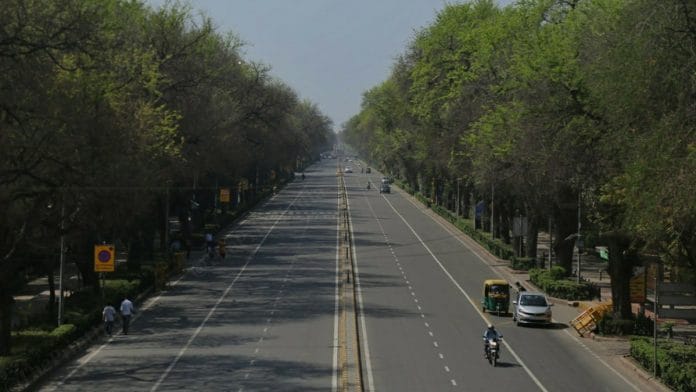Thank you dear subscribers, we are overwhelmed with your response.
Your Turn is a unique section from ThePrint featuring points of view from its subscribers. If you are a subscriber, have a point of view, please send it to us. If not, do subscribe here: https://theprint.in/subscribe/
In the early days of the COVID-19 lockdown, when much of the world came to a standstill, something remarkable happened: skies cleared, birds returned to cities, and pollution levels dropped to record lows. It was an unexpected environmental reprieve, but one that came at a profound economic and human cost. Millions lost jobs, livelihoods were upended, and consumption patterns were forcibly restrained.
It is tempting to romanticise that moment as a window into what a cleaner, greener future might look like. But it also revealed an uncomfortable truth: our current model of economic growth and environmental sustainability are not just at odds, they may be fundamentally incompatible unless we rethink our assumptions.
This dilemma was at the heart of a recent conversation among colleagues, which began with a seemingly simple observation: during lockdown, pollution decreased because consumption plummeted. But as the discussion evolved, it revealed a much deeper and more complex question; what do we really mean by “progress,” and at what cost does it come?
The Economics of Want-Based Consumption
Modern economic systems are built on the engine of consumption. GDP growth, the most-watched metric of development, is inextricably tied to how much people are spending. But increasingly, this spending is driven not by need but by want. Fast fashion, ultra-processed foods, meat-heavy diets, plastics, and energy-intensive gadgets define contemporary consumption.
In the 1980s and 1990s, India’s economy was simpler. There were fewer goods, fewer choices, and arguably, a cleaner environment. But there was also less access to technology, communication, and healthcare. So while the environment may have been in better shape, the human development index lagged.
Today, we are wealthier, better connected, and more efficient; but also more wasteful. The same technological sophistication that gives a villager access to online education also brings with it a flood of e-waste, packaging, and energy demands. Every increase in engineering capability, every uptick in trade and tariffs, adds complexity, and often, environmental cost.
Tariffs, Trade, and the Environment
One of the more interesting tangents in the discussion was whether trade tariffs, often viewed through the lens of economic nationalism or protectionism, might unintentionally serve as a brake on overconsumption. Higher tariffs reduce purchasing power, limit the affordability of imported non-essential goods, and indirectly curb excessive consumption.
This is not to argue for economic isolation, but to consider that economic levers like tariffs might have environmental spillovers that are not typically part of policy discourse. Mainstream economics rarely accounts for environmental degradation in its cost-benefit calculus. The degradation of a river, the extinction of a species, or the health cost of pollution seldom show up in quarterly earnings or national accounts.
But perhaps they should.
Is Less Really More?
This leads to a provocative moral question: would we be willing to trade off some material progress for a better environment?
Consider this hypothetical: You have a cleaner environment, but no smartphone. Air is pure, but there’s no internet. Water bodies are thriving, but transport is rudimentary. Would that be acceptable? For many, particularly those born into the digital age, the answer would be no.
The implication is stark: the very things we define as progress; connectivity, mobility, choice are also the things accelerating environmental harm. To want progress is, in many ways, to tolerate degradation.
Is there a middle path?
Towards a Balanced Future
If zero humans meant a perfect environment, is that the ideal? Of course not. But neither is blind acceleration without guardrails. The future lies in moderation, in recalibrating our idea of prosperity not as a race to consume more, but as a journey to consume wisely.
This is not a Luddite argument. No one is suggesting we go back to the 90s or live in caves. But we must reimagine progress beyond GDP. Metrics like ecological footprint, per capita waste, or carbon per dollar of GDP should feature in economic policy. Technology should be harnessed for circularity, not just convenience. Urban planning should be as much about green spaces as it is about smart grids.
Reframing Policy and Mindsets
Ultimately, this is not a debate between growth and sustainability, but about redefining both. Tariffs, subsidies, innovation, and education all have a role to play. But more than anything, what’s needed is a shift in public consciousness, from limitless wants to conscious consumption.
This is where organisations like Vastuta step in. Our mission is to spark difficult but necessary conversations around labour, agriculture, economy, and environment, not as isolated silos, but as interconnected systems. Through policy insights, field engagement, and digital storytelling, we aim to build a new vocabulary of progress that India can embrace.
Because the question isn’t whether we want progress. It’s what kind of progress we’re willing to live with and what we’re prepared to leave behind.
These pieces are being published as they have been received – they have not been edited/fact-checked by ThePrint.


